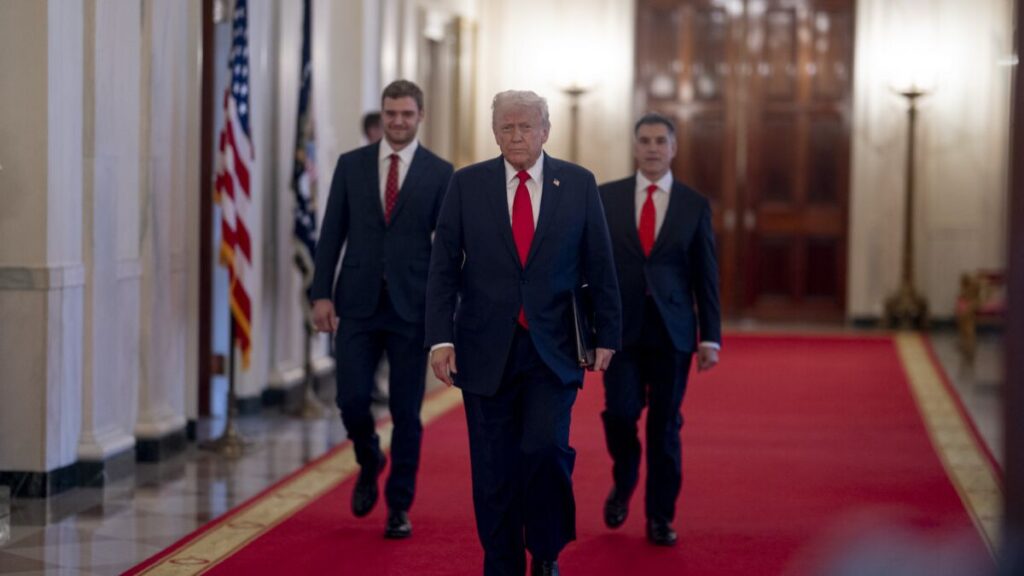In January 2025, shortly after a ceasefire was achieved between Israel and Hamas, U.S. President Donald Trump introduced a controversial proposal that shook the geopolitical landscape. The idea of the U.S. taking control of Gaza and resettling its Palestinian population in neighboring Arab countries has sparked both intrigue and outrage. While Trump views this plan as a bold initiative for peace and development, it raises numerous questions about its feasibility and the potential ramifications for the region.
The Plan: A New Vision for Gaza
Trump’s proposal suggests that the U.S. would take charge of rebuilding Gaza and transforming it into a thriving, peaceful region. He envisions a future where Gaza becomes the “Riviera of the Middle East,” with modern homes and a safe, prosperous environment for the Palestinian population. Under this plan, Israel would “turn over” Gaza to the U.S. after the conflict ends, while the two million Palestinians living there would be resettled in safer and more beautiful communities in neighboring countries like Jordan and Egypt. Remarkably, Trump claimed no U.S. soldiers would be required for the operation.
Trump’s assertion is underpinned by his background as a real estate mogul. The prospect of rebuilding Gaza appeals to his vision of leveraging U.S. resources to restore order and stability, much like he did during his tenure with policies aimed at transforming the Middle East. Moreover, Gaza’s untapped offshore natural gas reserves add a layer of economic incentive to the proposal.
Reactions: From Support to Rejection

While Trump’s plan has garnered mixed reactions, the initial response has been highly critical, especially from Arab nations and international powers. Israeli Prime Minister Benjamin Netanyahu has called the idea “remarkable,” but the broader Middle Eastern and international communities have expressed grave concerns.
Arab Rejection
Arab governments, particularly in Egypt, Jordan, and the Gulf states, have firmly rejected the proposal. Egypt has raised alarms about the disastrous consequences of such a plan, warning that it could undermine ceasefire efforts and reignite conflict. Jordan, too, views the plan as an existential threat, rejecting any attempt to resettle Palestinians on its soil due to strong public opposition and concerns over national identity.
The UAE, Saudi Arabia, and Qatar also voiced strong opposition, emphasizing their commitment to a two-state solution and the protection of Palestinian rights. These countries, which have played key roles in mediating peace efforts, fear that Trump’s plan would exacerbate tensions in the region and jeopardize their diplomatic standing.
Global Opposition
The plan has also drawn condemnation from outside the Middle East. European countries like Germany, Spain, and Norway, along with major international powers like China and Russia, have criticized the proposal for its potential to inflame tensions and destabilize the region. While the U.S. and Israel are aligned in their strong support of each other, the broader international community remains wary of any moves that could undermine Palestinian sovereignty and peace prospects.
The Logic Behind the Proposal
Despite the widespread opposition, Trump’s plan is not entirely without logic. As a real estate mogul, Trump sees an opportunity to reshape Gaza using his business acumen. He is known for thinking in terms of big projects and long-term investments. The possibility of turning Gaza into a developed region with high potential for economic growth aligns with Trump’s “Make America Great Again” slogan, which often emphasized infrastructure and economic revival.
Moreover, his administration had already taken bold steps in its approach to the Middle East. Trump’s recognition of Jerusalem as the capital of Israel and the shifting of the U.S. Embassy there, despite global condemnation, demonstrated his willingness to take risks to solidify U.S.-Israel relations. His peace initiatives, such as the Abraham Accords and his administration’s efforts to de-escalate tensions with Iran, reflect his commitment to changing the Middle Eastern status quo. In this context, the Gaza plan could be seen as an extension of his broader vision.
Read More: Why Trump’s Suggestion to Exclude Ukraine From Peace Talks Could Lead to Devastating Consequences
The Palestinian Question: A Threat to Regional Stability?

At the heart of Trump’s Gaza plan is the Palestinian question—a long-standing issue that has fueled much of the region’s conflict. The proposal to resettle Palestinians in neighboring countries raises deep concerns about their rights, sovereignty, and the potential for further instability.
Many Arab nations, particularly Egypt and Jordan, have already absorbed significant numbers of Palestinian refugees from past wars. These countries are deeply concerned about the security and economic impacts of taking in millions more. Moreover, any displacement of Palestinians from Gaza risks reigniting old grievances and tensions that could destabilize the region further.
The Gulf States, while having contributed financial aid to Palestinians, remain firm in their support of a two-state solution. They continue to push for diplomatic negotiations that would allow for a Palestinian state alongside Israel, without compromising Palestinian identity or rights.
Saudi Arabia’s Role: A Crucial Pivot
Saudi Arabia, the leader of the Arab world, has maintained a delicate balance between its alliances with the U.S. and its support for Palestinian statehood. While the Kingdom has been open to discussions with Israel in the past, its position on the Palestinian issue remains clear: it will not establish diplomatic relations with Israel unless a Palestinian state is created.
In early February 2025, following Trump’s remarks, Saudi Arabia reaffirmed its commitment to the Palestinian cause, rejecting any attempt to displace Palestinians from their land. The Kingdom’s statement emphasized that any peace efforts must include the creation of an independent Palestinian state. Whether Saudi Arabia will maintain this stance or alter its approach in the face of international pressure remains to be seen.
The Geopolitical Implications: A Potential Game-Changer?
Trump’s Gaza plan could significantly alter the geopolitical dynamics in the Middle East. If implemented, it could reshape U.S.-Israel relations and possibly change the balance of power in the region. However, it also risks alienating key Arab allies and undermining international efforts to broker a long-term peace agreement.
The plan’s economic and diplomatic ramifications cannot be ignored. If the U.S. offers financial aid in exchange for resettling Palestinians in other countries, it could shift the balance of power in the Middle East, with the U.S. playing an even more influential role in the region’s future.
Read More: DOGE’s $29M Cut: The End of U.S. Involvement in Bangladesh’s Political Reform?







